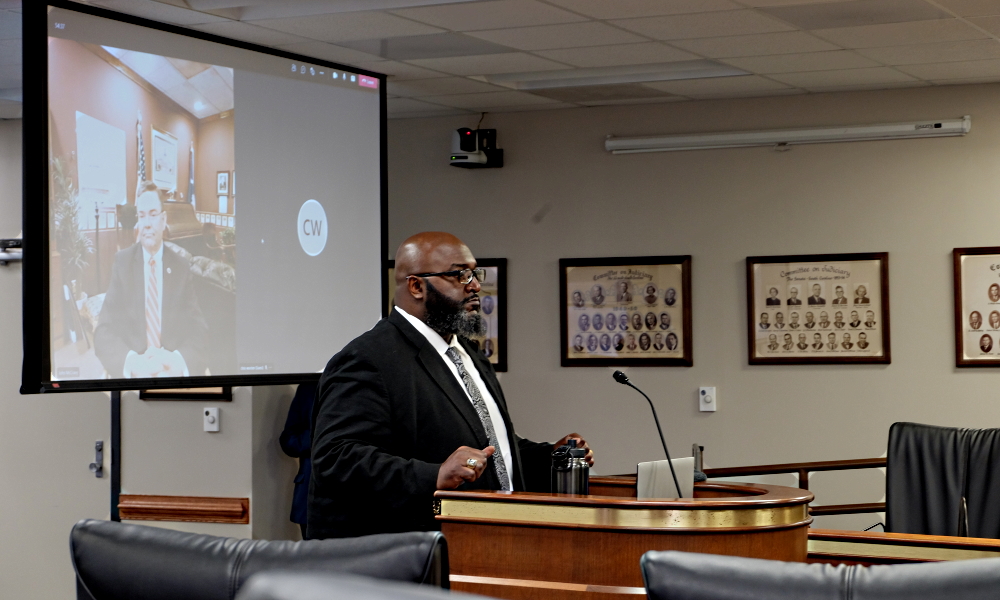
Michelle Liu/AP Photo
South Carolina Department of Juvenile Justice Director Freddie Pough testifies in front of state lawmakers in Columbia, S.C., on Thursday, May 20, 2021. Lawmakers are scrutinizing the department after a scathing government audit last month found a failure to maintain adequate security staffing, an uptick in violence and many other deep-rooted problems.
COLUMBIA, S.C. (AP) — South Carolina legislators are pushing to replace the director of the state’s embattled juvenile prisons, who stumbled through more than three hours of questioning last week.
Lawmakers are scrutinizing the department after a scathing report released by the Legislative Audit Council last month found there has been an uptick in violence, a failure to maintain adequate security staffing as well as many other deep-rooted problems.
Department of Juvenile Justice Director Freddie Pough, who was designated interim director in 2017 and appointed permanently a year later, inherited many of the problems found in a 2017 audit that led to his predecessor’s resignation. But legislators aren’t satisfied with any progress he’s made, saying agency facilities remain dangerous to both children and staff.
“We keep talking about all these things that are going to happen,” said GOP Sen. Katrina Shealy, who chairs the panel of lawmakers reviewing this year’s audit. “But you’ve been director for four years … we can’t keep waiting for them to happen.”
Democratic Sen. Dick Harpootlian said he found Pough’s testimony “disturbing,” citing Pough’s Thursday admission that he has never read the state law requiring him to report abuse or neglect of children to welfare or law enforcement agencies.
More than one lawmaker present cited incidents that agency officials failed to report to the State Law Enforcement Division or other departments. Others grew frustrated as Pough struggled to cite statistics such as how many corrections officers were actively working at the agency’s Columbia facility.
Standing at the podium with a towel he occasionally used to mop sweat from his brow, Pough rebutted some of the findings in the report, denying any intent to obstruct the audit. Lawmakers had previously expressed concern over an email Pough sent telling staffers to report any interactions with auditors back to an agency employee.
To address a severe staffing shortage, the department has added sign-on and referral bonuses, Pough said. The agency also is implementing a camera system that will eliminate blind spots and allow employees to keep watch of kids even with limited staff, Pough said.
“When I gladly took this position, I understood that the agency needed a lot of repair,” Pough said. “I was hopeful I would get the support … to make those changes.”
Other legislators asked how Pough would deal with students sexually harassing teachers or ensure staff safety and retain security officers. Some wondered why Pough wasn’t using money budgeted for correctional officer positions he couldn’t fill to solve other problems.
Democratic Sen. Mia McLeod said that until recently, she had a relative working as a teacher at the agency, referencing a gang fight that involved an entire classroom full of kids and led to one teacher getting injured. She wanted to know what Pough’s plans were to change agency culture.
He admitted that the agency needs staffers to learn de-escalation skills and other tools to use in such incidents.
“We have to do a better job of educating staff, and just because it doesn’t appear that something is not being done, doesn’t mean it’s not being done,” Pough said.
Last year, federal investigators found the agency was violating the civil rights of incarcerated youths, from failing to train staff to using “punitive, prolonged” isolation units that left youths confined to small, dark cells for 23 hours a day.
The U.S. Department of Justice then ordered juvenile prison officials to begin making changes in less than two months or face a lawsuit. At the time, Pough promised to improve facility conditions, though he noted those problems had been present since before he took charge.
Harpootlian, one of Pough’s toughest questioners Thursday, said he couldn’t figure out why Pough was in charge.
“I don’t understand why you’re still there,” Harpootlian said. “Would you consider resigning?”
“No, sir,” Pough replied.
Liu is a corps member for the Associated Press/Report for America Statehouse News Initiative. Report for America is a nonprofit national service program that places journalists in local newsrooms to report on undercovered issues.





























